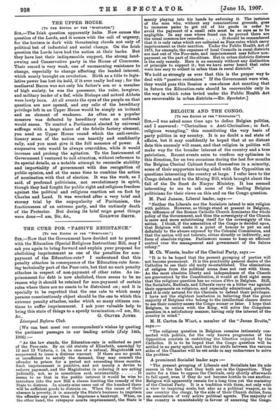THE UPPER HOUSE.
ITO Tim EDITOR or TIIII "SPECIATOR.1 S1R,—The Irish question apparently halts. Now comes the question of the Lords, and it comes with the call of urgency, for the horizon is dark with threatening clouds not only of political but of industrial and social change. On the Irish question the Lords have had the nation at their backs. But they have lost their indispensable support, the strong land. owning and Conservative party in the House of Commons. Their record is very weak, one of unreasoning resistance to change, especially to change affecting the landed interest, which nearly brought on revolution. Birth as a title to legis- lative power has lost its hold, if it ever really had any ; for the mediaeval Baron was not only his father's son or a member of high society, he was the possessor, the ruler, lawgiver, and military leader of a fief, while Bishops and mitred Abbots were lowly born. At all events the eyes of the people on that question are now opened, and any relic of the hereditary privilege left in an Upper House would be simply an irritant and an element of weakness. As often as a popular measure was defeated by hereditary votes an outbreak would ensue. To control a Parliament elected by universal suffrage with a large share of the febrile factory element, you need an Upper House round which the anti-revolu- tionary sense of the nation can heartily and confidently rally, and you must give it the full measure of power. A suspensive veto would be always overridden, while it would increase and prolong the agitation. To the Instrument of Government I ventured to call attention, without reference to its special details, as a notable attempt to reconcile stability and impartiality of government with due recognition of public opinion, and at the same time to combine the action of nomination with that of election. It was the work, as I said, of profound politicians, not revolutionary in spirit, though they had fought for public right and religious freedom against the political and religious reaction set on foot by Charles and Laud. It was wrecked after a very brief and stormy trial by the unpopularity of Puritanism, the fractiousness of an extreme party, and the untimely death of the Protector. But during its brief reign great things






































 Previous page
Previous page